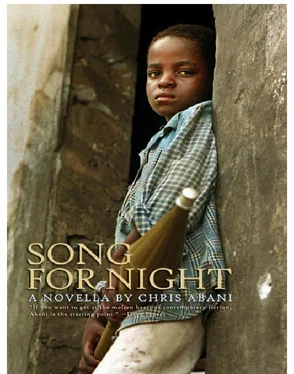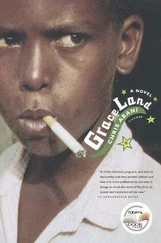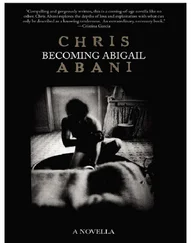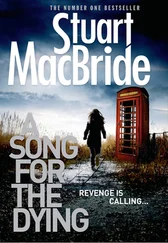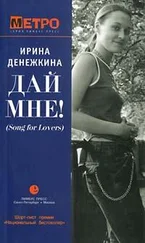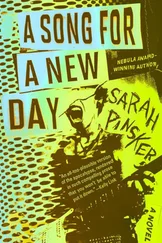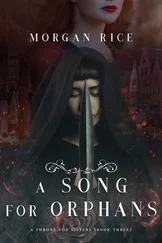We had made a stop to rest, the whole troop, vultures and all; plus a long train of refugees who had attached themselves to us thinking we could keep them safe. I had no idea where we were, but I didn’t care. It was all still new enough to be exciting. Even then, the dirt was irritating and the vultures in particular. That band of soldiers who had to count the dead were already in the river trying to wash. My platoon and I were lying in the shade of the flame of the forest, and from that shelter I looked around me. Accompanying the refugees were some nuns — probably Irish, it seemed like all the Catholics here were — and they all wore that tight-lipped look that years of enduring Catholicism bestows on the pious, except for one of them. She was wandering around with a curious smile on her face. She looked unhinged. We turned and peered at each other and then back at the nun. We guessed that for her the dirt was more bearable than the debris that had no doubt collected in her mind, befuddling her. It was early on in the war, when the horrors were still new enough to unhinge decent people.
We watched her wander over to an outcrop of rock overlooking the river. She stood there awhile, the entranced smile on her face, and then without warning she leapt off. From that height the fast-flowing water below would be solid enough to knock her out and drag her under, delivering her into the ocean. For a moment though, it seemed like she was suspended in midair like a big black crow, her habit flapping like angry wings, before she disappeared, leaving behind a piercing scream.
Ijeoma shook her head. She was the first to speak: telepathy this time.
“The bird who made the world was like that. A big black thing with a white beak, and it flew over the face of the dark waters; it’s screeching the first sound in God’s memory, waking creation. Just like that.”
We lit cigarettes, the whole platoon in one synchronized but unrehearsed movement, twenty of us in those days, and we sighed in a collective out-breath of smoke before returning to scratching from the dirt.
This dirt will not wash off with water.
Not even in a river.
What kind of God makes a world like this?
“Not God,” Isaiah, our prophet, signed. “Man.”
Ijeoma smiled.
“You know people,” she said. Then she raised her forefinger to God and wiggled her body before bending down to pick up a pebble. Taking careful aim, she threw it at Nebu. We broke into play, throwing tiny pebbles at each other until we were a mass of small stings and lumpy bumps. We were flushed and breathing hard when we stopped, and grateful — for the pain that penetrated that skin of dirt.
On the outcrop of rock over the river, another nun prayed for the suicide. In the distance, John Wayne was expounding on his manual loudly to a group of bored officers.
I return.
Now, sitting here, I realize that was important because it reminds me that even if water won’t wash me clean, hope might.
A mosquito bites me. It is getting dark.
Cowardice Is Spitting Once
A wind sets to howling in the flame tree and I shiver in fear. I know it is the wind but it might also be disembodied spirits, or ghosts, or demons. The amount of blood on my hands doesn’t grant me the luxury of complacence, and no amount of horror seems to have inured me to my own pain, or fear, or hunger, or desire. Only to that of others: war and its attendant deviance hasn’t made me braver, only more callous. If any of my men could see me now, they would spit at my feet. The sign for cowardice.
The wind is calling in a voice I remember. A man John Wayne chased down into a woman’s kitchen, a man unarmed and afraid, and John pulled him out and made him butcher his children in front of us. In that kitchen as though he would make a gory feast of them, as though he was a host and we his invited guests. And as that man chopped with the machete, blood spattering his face, I flinched from the greed in his eyes. The greed for living that made him do that, and then when he was done and panting from the effort, John Wayne put his revolver point blank to the man’s head and blew his brains across the kitchen wall.
Tonight he is howling in the wind.
But I can’t tell if it is anger, shame, or remorse.
Shit, I need to find my platoon. I cannot go on like this.
A Question Is a Palm Turning Out from an Ear
If we are the great innocents in this war, then where did we learn all the evil we practice? I have seen rebel scouts cut off their enemies’ ears or fingers or toes and keep them in tin cans as souvenirs. Some collect teeth, which they thread painstakingly into necklaces. Who taught us this?
Who taught me to enjoy killing, a singular joy that is perhaps rivaled only by an orgasm? It doesn’t matter how the death is dealt — a bullet tearing through a body, the juicy suck of flesh around a bayonet, the grainy globular disintegration brought on by clubs — the joy is the same and requires only the complete focus on the moment, on the act.
Before the hate, before the war, I was in love with a little girl on my street, Aminatu, who gave me toffees from the jar on the counter in her mother’s shop. I loved those toffees, always half-melted from the heat of her clenched palm and smelling faintly of her sweat.
I have never been a boy. That was stolen from me and I will never be a man — not this way. I am some kind of chimera who knows only the dreadful intimacy of killing. If it would help, I would cry, but tears are useless here. Anyway, I can’t afford to lose any more fluids until I find clean drinking water. God, all this time and no water.
There are many ways to die in a war. Dehydration is one.
For the want of water.
Vision Is the Same As Dreaming
I am in the middle of a battlefield.
The Angelus rings and I stop and lower my head. Before me, Ijeoma does the same. Behind us and all around but invisible in the shadows are the sounds of wings, a host of unseen. Ijeoma and I mouth the prayer together, lips folding greedily around words we can never utter: The angel of the Lord appeared unto Mary … Hail Mary … the words burn in us, like the love we still share. I finish and look up smiling.
Ijeoma is not smiling. Instead, she aims her rifle straight at my chest. I flinch at the report; flinch as the bullet tears through me. I feel my chest. No blood, no wound, nothing. Maybe it’s a ghost bullet.
I look over at Ijeoma and now she is laughing. Silently, of course, but no less abandoned. I am in shock for a moment, then I drop my head back and howl at the moon. The hard convulsions of my throat, not the sound, wakes me.
I shiver in the dark. Something disturbs the fruit bats, maybe a python, and they scatter from their perches in the trees into the night, their wings like the sound of a hundred ghosts and their high-pitched squeals unbearable. It drives me to a deeper hysteria and I fire blind into the sound. Tonight the world is full of fallen angels.
A Train Is Forearms Back and Forth Like Pistons
This village, nothing more than an old water stop for the train, is no more. All that I see is the rubble of some huts. There is only one standing — roofless, but humped there in the night, its protruding sticks and poles and crumbling earthen body give it the look of an elephant’s skeleton. I pause by it, leaning against a pole. This trek of mine is getting more and more ridiculous, I think. I am mostly moving from one scene of past trauma to another, the distances between them, though vast, have collapsed to the span of a thought, and my platoon is ever elusive. I am thoroughly confused, but my desire — which is larger than my need to find my platoon, yet wrapped into it — is relentless in propelling me forward. I look at my watch. Ten minutes, it says. Ten minutes to or after, I cannot tell. Nor the hour; still, there is reassurance in looking at it.
Читать дальше
